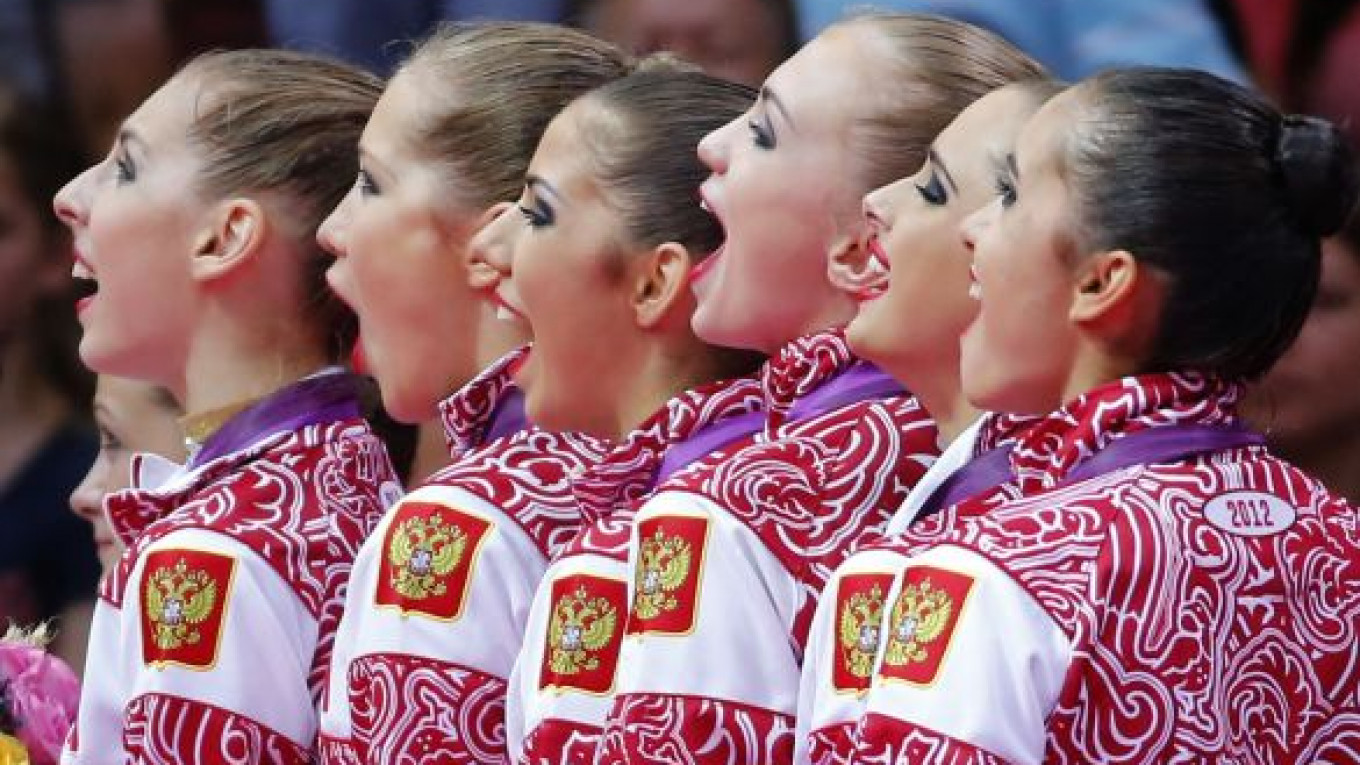Russia placed fourth in the total medal count at the London Games, its worst performance at a Summer Olympics since the Soviet Union began competing in the games in 1952.
But if all the gold medals that former Soviet states won at this Olympics were counted together, the unified team would have done about as well as second-place China.
Still, many have criticized Russia's performance in London as attention focuses on the nation ahead of the 2014 Winter Olympics in Sochi, seen as an ambitious project for President Vladimir Putin to bring back the glory days of Soviet athletics.
Russia won the most bronze medals of any country, 33, a sign that the team "did not reach its peak," said Ves Sport news agency chief Andrei Mitkov.
Only one event, the women's modern pentathlon, was left by 9 p.m. Sunday Moscow time, and Russia was not expected to win a medal.
"Many athletes did not compete in their full capacity, and the results are very mediocre," said German Prostov, a former Soviet rower who now lives in the United States. "Russia is no longer the athletic powerhouse that it used to be during the Soviet Union."
"It is quite a disappointment when compared with the U.S. Olympic team," Prostov said.
Russia's gold tally, 24, is one higher than its third-place finish at the 2008 Summer Olympics in Beijing. But this time around, host country Britain fared much better. While it reaped 19 gold medals in Beijing, it won 29 on its home turf.
Russia was able to get three gold medals in judo, a sport personally favored by Putin. The president met with the victors and joined them for a celebratory drink, asking their coach to allow them for the occasion to break their creed to abstain from alcohol.
The official reaction to the Russian team's performance has been contradictory. While presidential administration head Sergei Ivanov has described it as a "failure," Sports Minister Vitaly Mutko has said the team was performing "quite well."
Though Mutko's comment has caused backlash, the official will likely keep his post because he is trusted by both the president and prime minister. Mutko remained sports minister even after Russia's 11th-place, worst-ever finish at the 2010 Winter Olympics in Vancouver.
Putin’s spokesman Dmitry Peskov said there would be “no firings” over the Olympics and that the winners would be awarded. He called Russia's performance “splendid.”
Mutko has also accused judges of favoritism. After lightweight boxer Sofya Ochigova’s close loss to Ireland’s Katie Taylor, he said, “How can you give such scores? You’d have to be blind,” RIA-Novosti reported.
Mutko told the Sovietsky Sport newspaper last week that sports science and medicine for athletes needed to be improved for better results.
Ves Sport's Mitkov said Mutko's comment refers to the negative effects of a governmental decision to switch the responsibility for sports medicine from the Sports Ministry to the Health Ministry in 2009.
Mitkov added that Mutko was not able to bring athletic education under the command of his ministry from the education ministry, despite a year of trying.
Speaking about his plans for after the Olympics, Mutko said he is not going "to cut off heads to amuse the public," Sovietsky Sport reported last week.
Only 8 percent of Russians were satisfied with the national team's performance, according to a survey by SuperJob.ru last week. More than 38 percent said they expected more from the team.
Prostov thinks that one of the reasons for the team's poor performance is a lack of money. "A lot funds have been stolen, not delivered to their final destination," he said.
After Vancouver, the Audit Chamber reported that huge sums allocated for the Olympic team had been misused.
Mitkov said better results can be more easily obtained by those sports that are closely connected to federal bodies, even though some trainers have pushed for independence. "They think they are the masters, but they are failing," he said.
Mitkov cited the Russian Shooting Union, headed by billionaire Vladimir Lisin. The shooting team failed to bring home any gold medals despite heavy financing. It got only one bronze.
A Message from The Moscow Times:
Dear readers,
We are facing unprecedented challenges. Russia's Prosecutor General's Office has designated The Moscow Times as an "undesirable" organization, criminalizing our work and putting our staff at risk of prosecution. This follows our earlier unjust labeling as a "foreign agent."
These actions are direct attempts to silence independent journalism in Russia. The authorities claim our work "discredits the decisions of the Russian leadership." We see things differently: we strive to provide accurate, unbiased reporting on Russia.
We, the journalists of The Moscow Times, refuse to be silenced. But to continue our work, we need your help.
Your support, no matter how small, makes a world of difference. If you can, please support us monthly starting from just $2. It's quick to set up, and every contribution makes a significant impact.
By supporting The Moscow Times, you're defending open, independent journalism in the face of repression. Thank you for standing with us.
Remind me later.


